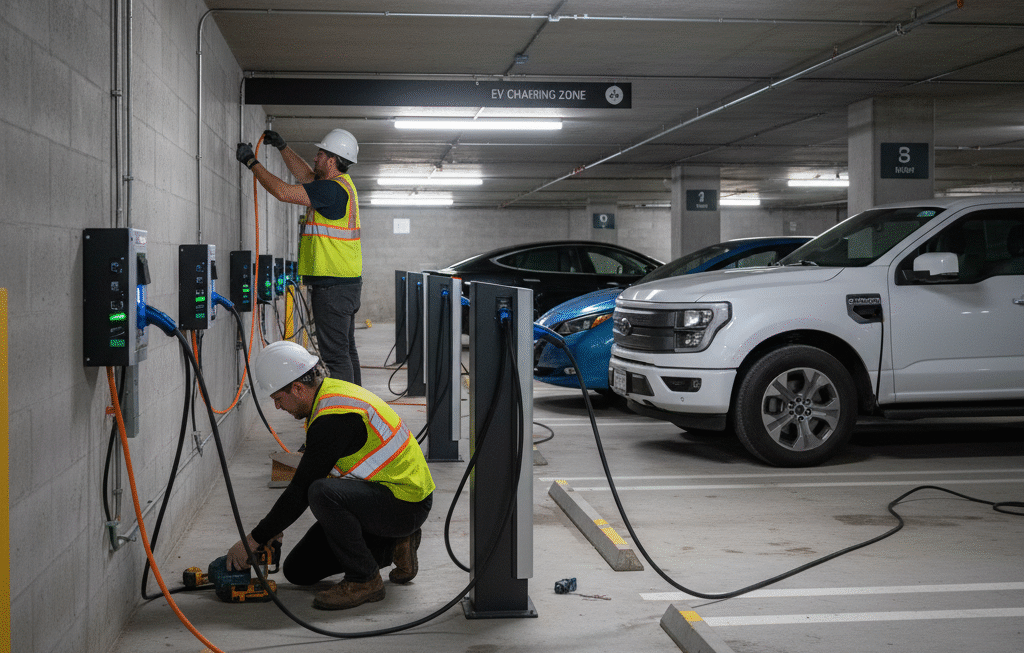Finding a reliable EV charger installation near me means connecting with certified professionals who can assess your home’s electrical system and install the right charger safely and efficiently. Many local services offer free consultations to evaluate factors like your electrical panel and preferred charger model.
Choosing a qualified installer ensures the installation is done correctly, optimizing charging speed and preventing potential electrical issues. Home improvement stores, specialized companies, and certified electricians often provide these services with varying costs based on individual needs and location.
Understanding the installation process, pricing, and local options can save time and money while providing peace of mind. This article will guide readers through what to expect when searching for an EV charger installation close to home.
Choosing the Right EV Charger Installation Service
Selecting an EV charger installation service requires attention to specific details that impact safety, cost, and future usability. Key elements include evaluating installer qualifications, comparing local providers for pricing and service options, and verifying electrician certifications and experience.
Factors to Consider in Selecting an Installer
The installer should be specialized in EV chargers rather than general electrical work. This expertise ensures they understand the unique electrical demands and permit requirements associated with EV charging stations.
Transparent pricing is essential. The installer must provide a clear breakdown of costs, including equipment, labor, permits, and potential upgrades to electrical panels. This prevents unexpected expenses later.
Accountability is another factor. A reliable installer handles permits, communicates with the utility company if necessary, and offers warranties or support after installation. This ensures the project is compliant and supported post-installation.
Comparing Local EV Charger Installation Providers
When comparing providers, reviewing customer reviews and ratings helps assess service quality. It is important to check if the installer offers site evaluations to determine the best charger placement and electrical capacity.
Service offerings should include end-to-end responsibility—site assessment, purchase advice, installation, and post-installation inspection. Some providers partner directly with charger manufacturers or utility companies, which can streamline the process.
Pricing comparisons should factor in both upfront costs and long-term value, including reliability and warranty coverage. Scheduling flexibility and estimated installation times are also relevant to ensure convenience.
Certifications and Experience of Electricians
Electricians installing EV chargers must hold active electrical licenses in their state or region. Certifications specific to EV charger installation, such as from recognized programs like Qmerit, signal specialized training.
Experience with residential and commercial EV charger projects indicates familiarity with different electrical systems and local regulations. An installer with several years of focused experience is less likely to encounter issues during installation.
Verifying credentials through official licenses and customer references is recommended. Experienced electricians also often provide detailed safety checks before and after installation to meet code requirements and ensure operational efficiency.
EV Charger Installation Process
Installing an EV charger involves several clearly defined steps to ensure the system is safe, efficient, and compliant with local codes. The process starts with evaluating the site, understanding the charger options, securing permits, and finally, ensuring long-term maintenance.
Site Assessment and Consultation
A professional installer begins by inspecting the property to assess electrical capacity and the best location for the charger. This includes checking the main electrical panel, available circuits, and the proximity to the parking area.
They discuss the homeowner’s daily driving habits and charging needs to recommend the right charger type and power level. The consultation often includes identifying any upgrades, such as panel enhancements or new wiring, required for installation.
A thorough site visit helps prevent surprises, allowing for accurate cost estimates and realistic timelines.
Types of EV Chargers and Compatibility
There are primarily two levels of chargers: Level 1, which uses a standard 120V outlet, and Level 2, which requires a 240V supply for faster charging. Level 2 chargers are the most common for home installations.
Chargers can be hardwired or plug-in, with smart chargers offering Wi-Fi connectivity for monitoring and scheduling. Compatibility with the EV model is crucial; almost all EVs support Level 2, but charging speed depends on the vehicle’s onboard charger.
Choosing the right charger depends on daily mileage, available electrical capacity, and desired charging speed.
Permitting and Local Regulations
Before installation, securing proper permits is necessary to comply with local building and electrical codes. Permit requirements vary by city and may involve inspections before and after installation.
Licensed electricians typically handle the permitting process, ensuring all work meets safety standards. Failure to obtain permits can result in fines or the need to redo work, so this step is critical.
Installers also ensure compliance with utility company rules and may advise on rebate programs or incentives tied to approved installations.
Post-Installation Support and Maintenance
After installation, the contractor usually tests the system to confirm it’s charging correctly and safely. They may offer guidance on charger operation, maintenance, and troubleshooting.
Regular maintenance involves inspecting connections and cleaning charging ports. Software updates on smart chargers can improve functionality and security and are typically user-initiated.
Accessible support from the installer or manufacturer helps address issues promptly, preserving charger efficiency over time.


